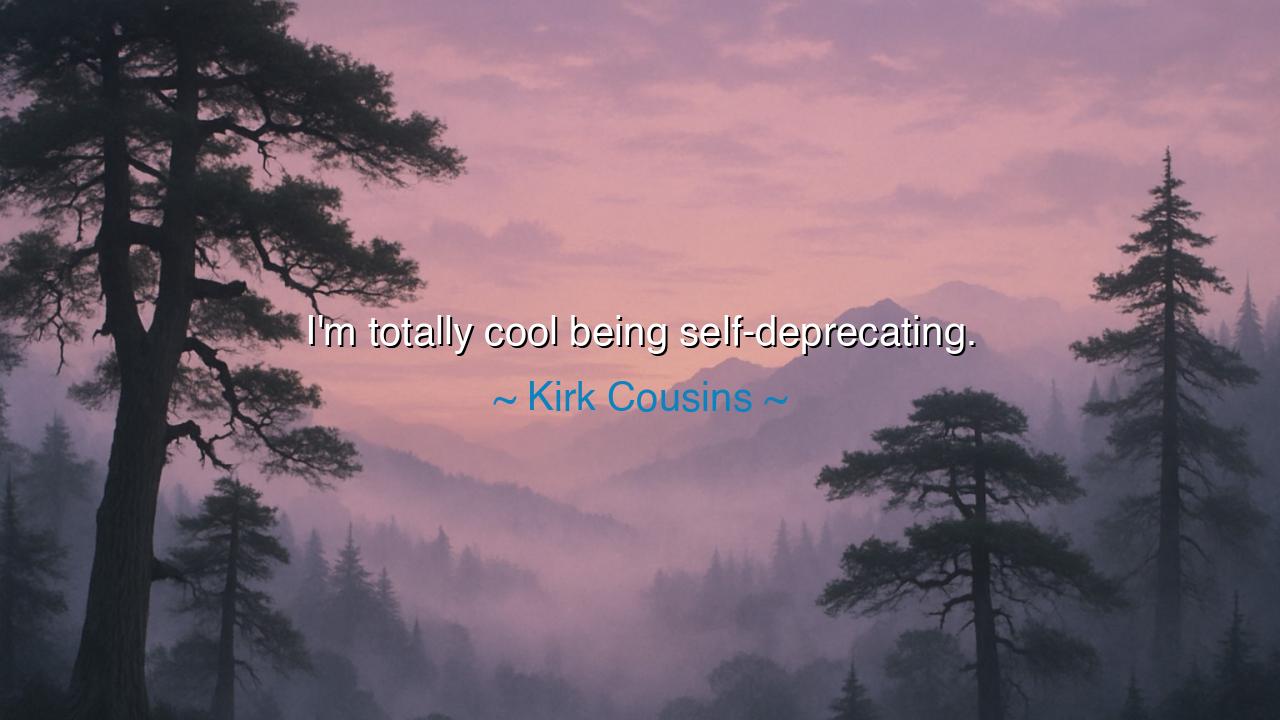
I'm totally cool being self-deprecating.






“I’m totally cool being self-deprecating.”
— Kirk Cousins
In these simple and unassuming words, Kirk Cousins, the steadfast quarterback known for his humility and quiet strength, reveals a truth that cuts to the heart of character and leadership. When he says, “I’m totally cool being self-deprecating,” he speaks of the power that lies in humility, the rare courage to laugh at oneself without shame. This is not the weakness of a man who doubts his worth, but the wisdom of one who knows it. For true confidence is not loud or defensive—it is calm, gracious, and unthreatened by imperfection. In a world where pride so often masks insecurity, Cousins reminds us that the highest form of strength is to own one’s flaws and still walk tall.
The origin of this quote springs from Cousins’ experiences as both an athlete and a man of faith. Under the lights of the stadium, he has known the weight of expectation, the roar of criticism, and the praise that fades as quickly as it comes. In such an arena, ego can easily become a tyrant. Yet Cousins chooses another way—the way of self-awareness and lightheartedness. He can acknowledge his mistakes with a smile, make fun of himself when he errs, and in doing so, remind both teammates and fans that to be human is to be imperfect. His words, though spoken casually, carry the timeless wisdom of the ancients: he who can laugh at himself has already conquered pride.
To be self-deprecating in this sense is not to belittle oneself—it is to find freedom from the constant need for validation. The ancients revered this virtue. The philosopher Socrates, though considered the wisest of all men, often called himself a fool to remind his listeners that wisdom begins in admitting ignorance. Likewise, Marcus Aurelius, emperor of Rome, wrote in his Meditations: “Do not imagine that you are more than a man; be content to fulfill your nature.” Both men understood that humility is not the opposite of greatness—it is the foundation of it. Cousins, standing amidst the glory and scrutiny of modern sports, embodies this same stoic ideal. By laughing at himself, he disarms the critics, wins the hearts of others, and remains uncorrupted by the illusion of perfection.
There is a story from the ancient East that mirrors this truth. Once, a mighty general was praised by his soldiers for never showing fear or flaw. He smiled and replied, “If you knew how often I tremble, you would not call me fearless—you would call me honest.” That honesty gave his men more courage than his armor ever could. So it is with those who embrace self-deprecation: they turn vulnerability into strength. By showing they can fall and rise again, they inspire others to do the same. Kirk Cousins, in his humble way, teaches this lesson to every young player watching—that greatness is not the absence of failure, but the ability to stand tall in spite of it.
There is also deep wisdom in humor itself. When a man can laugh at his own mistakes, he robs them of their power to wound. The laughter becomes a shield, forged from acceptance and humility. The one who mocks himself first cannot be destroyed by the mockery of others. Even the ancient kings of Egypt were taught to remember their frailty; at their coronations, a priest would whisper in their ear: “You are mortal.” This was not meant to humble them in shame, but to keep them balanced, aware that pride leads to downfall. Cousins’ self-deprecating nature carries that same reminder—that humility preserves the soul, even amidst glory and success.
In our modern age, where many seek to appear flawless—to polish every image, every word, every victory—this attitude is a rare jewel. To be self-deprecating is to resist the poison of pride and the fear of judgment. It allows a person to lead with warmth, to connect rather than dominate, and to find peace in authenticity. When a leader admits his faults, others see themselves reflected in him. When he laughs at his missteps, he invites others to breathe easier, to remember that perfection was never the goal. Such a person builds loyalty not through fear or performance, but through humanity.
So, my listener, let this truth take root in your heart: humility is not the absence of confidence—it is the highest form of it. To laugh at yourself is not to diminish your worth, but to declare your freedom from the fragile armor of pride. When you stumble, smile. When you are wrong, admit it. When others praise you, remember that you are still learning. In this way, you will walk with grace among men. Be not afraid to be imperfect, for imperfection is the proof that you are alive, growing, and real.
Thus, as Kirk Cousins reminds us, to be “cool being self-deprecating” is not merely a personal trait—it is a philosophy of life. It is to live unshaken by the opinions of others, anchored in humor and humility. The strong boast; the wise laugh. The proud build walls; the humble build bridges. And in the end, it is the bridge that endures, spanning the hearts of people and the passage of time.






AAdministratorAdministrator
Welcome, honored guests. Please leave a comment, we will respond soon